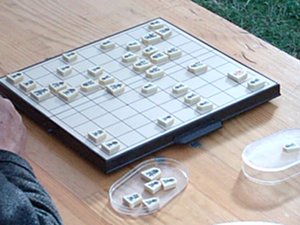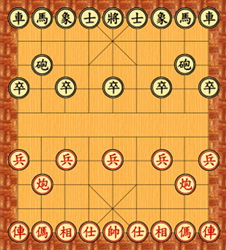For such a simple game, there's plenty of equipment available for sale. Boards, pieces, clocks, books, all sorts of stuff. All you need is a board and a set of chessmen, but it's not that simple, is it? All the different kinds of sets available, from fantastical to serious, from lavish to bare, from super expensive to simple cheap.
Well, you've come to the right place! Buy Chess Online taps into the world's largest marketplace - of course! You can find just about anything on eBay and that includes lots of really cool chess equipment for prices that are really impressive. World's largest can sometimes be too large, but don't worry - Buy Chess Online makes things easier. You can browse various categories of chess items, just select the stuff you want from either the menu bar on the top of the page or from the category list on the right sidebar.
Best Chess Variants
Like all popular games, chess has spawned lots of variants. The different possibilities are endless and vary from small and subtle to major game-changing makeovers. Whatever you choose, you end up with something different from standard chess — hopefully something interesting and refreshing.Since there are so many chess variants, we've decided to list some of the best variants. Try these chess variants to spice up your chess game! These variants are guaranteed to be functional, interesting games, even if some of them can be a bit unorthodox in their approach.
The variants are described briefly. In some cases that's enough to play the game, in other cases we'll link to complete rules.
- Avalanche Chess: After each move, player must move an opponent's pawn one step forward (called the "push"). Just one step, no captures allowed. Invented by Ralph Betza in 1977, this is one of the more popular chess variants. Apparently white has a major advantage that can be balanced by skipping the pawn push on white's first turn.
- Bughouse: This wild four-player game is very popular and often played for fun at chess clubs. In Bughouse or Tandem Chess players form two teams that play two games. Team members sit next to each other and one plays white in one game and the other black in the other game. The fun bit? When you capture a piece, you give it to your partner, who can drop it on her board instead of a regular move. This game should be played with chess clocks and short time limits (5 minutes or so) to prevent stalling. Read the complete rules.
- Exctinction Chess: In this variant, losing a single piece can be fatal! A player loses when he loses the last piece of a kind. Pawns are still expendable, while King and Queen are both most critical pieces (regular Check and Checkmate don't apply in Exctinction Chess). Good grasp on opening theory is highly valuable in this game, which was invented by R. Wayne Schmittberger, a well-known variant inventor.
- Fischer Random Chess: Invented by world famous Bobby Fischer, this is one the better known variants. It doesn't change any rules, just the board setup. Pawns are as usual, but the back row is randomized. King must be between rooks and bishops must be on different colours. After the white pieces are randomized, the black pieces are placed in the same order. There are 960 different setups for the game.
- Kriegspiel: This old variant was invented in 1899 in South Africa by Henry Michael Temple. The idea is simple: the players can't see their opponent's pieces! To play this game, a referee (or a suitable internet server) is needed. Players must try to make legal moves and can keep on trying until referee says they succeed. This is a very clever variant that takes a good amount of skill to play well. Read the complete rules.
- Losing Chess: This is very much a basic variant, as many, many other games have exactly the same variant where you win by losing. In Losing or Giveaway Chess you must capture if you can and you win by losing all your pieces. Kings have no special function and pawns can promote to kings. This is a real classic variant and well worth trying.
- Alice Chess: This curious game is played on two chess boards. One starts as usual, while the other starts empty. Every time a piece moves, it switches boards and ends up on the other board. This is a very unusual, but highly entertaining game. Read more about the variant.
- Shogi: This Japanese chess game is a variant in the same sense as the FIDE-regulated Western chess is a variant. Shogi is a slowish game, but it never runs dry, because captured pieces can return to the play, keeping the board full to the end game. Shogi also has several variants of its own. For more information, check out our Shogi page.
- Xiangqi: The Chinese game of Xiangqi is different from FIDE chess in different ways than Shogi. It's a good, quick-paced game with lots of action from early on. For more information, check out our Xiangqi page.
Shogi

Shogi is a Japanese variant of chess. Shogi was present in current form in the 16th century, so it's a pretty old game. It resembles Western chess perhaps a bit more than xiangqi, but has some pecularities. In general, shogi pieces are pretty slow, so the game begins very slowly. Things get heated and attrition never bites like in Western chess, because once you capture a piece, you can drop in on the board and it becomes your piece. This small change makes a huge difference.
Xiangqi

Xiangqi is Chinese variant of Chess. Western Chess and Xiangqi share common ancestry, but the two lineages forked a long time ago. The game is very popular in China and in Chinese communities all over the world, but is little known in USA and Europe. It's a bit of a shame, because Xiangqi is an exciting and fast version of Chess. Standard home game takes about 20-30 minutes.
The game is played on a 9 x 10 board, with pieces that are placed on the points where the lines cross. Each player has 16 pieces, like in regular Chess. There's a general (like king in Chess), two guards, two elephants (like bishop), two horses (like knights), two chariots (like rooks), two cannons and five soldiers.